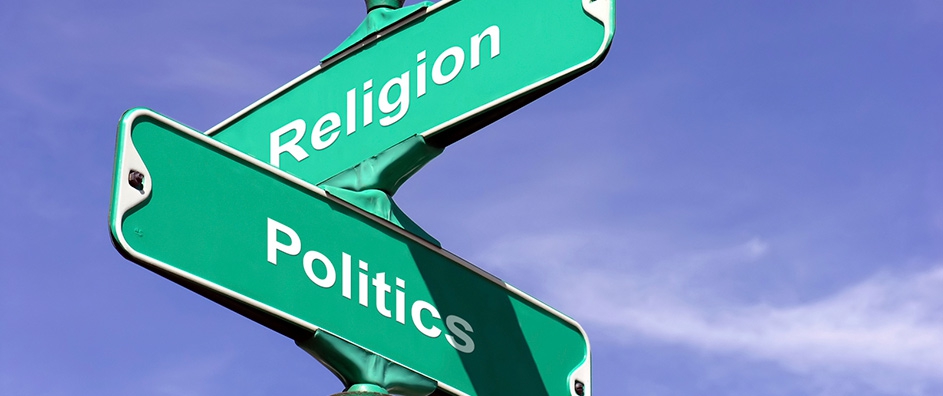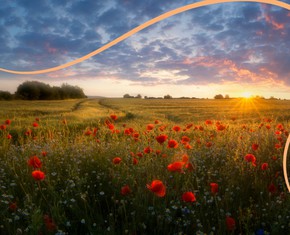The views expressed in our content reflect individual perspectives and do not represent the authoritative views of the Baha'i Faith.
Be ye the embodiments of justice and fairness amidst all creation. – Baha’u’llah, The Most Holy Book, p. 87.
…Religion should not concern itself with political questions. Religion is concerned with things of the spirit, politics with things of the world. Religion has to work with the world of thought, whilst the field of politics lies with the world of external conditions. – Abdu’l-Baha, Paris Talks, pp. 132-133.
When I became a Baha’i, I must admit, I initially struggled with the Baha’i principle of non-involvement in partisan politics, easily the hardest new spiritual concept for me to understand and follow.
 Raised without any real religion and in an era of great social upheaval, as a youth I had come to believe that the way to change the world for the better involved changing our political leadership. After all, I thought, if we had more peaceful and less prejudiced politicians in charge, they could lead us to a new and more enlightened state of society. Then several leaders—President Kennedy, his brother Robert, Malcolm X and Martin Luther King, Jr.—all fell victim to assassin’s bullets within the span of half a decade.
Raised without any real religion and in an era of great social upheaval, as a youth I had come to believe that the way to change the world for the better involved changing our political leadership. After all, I thought, if we had more peaceful and less prejudiced politicians in charge, they could lead us to a new and more enlightened state of society. Then several leaders—President Kennedy, his brother Robert, Malcolm X and Martin Luther King, Jr.—all fell victim to assassin’s bullets within the span of half a decade.
After those tragic events, when my country subsequently elected many leaders who continued its wars, failed to adequately address its racism and frustrated efforts to build international unity, I began to realize that politicians can only do what the general populace elects and allows them to do. Leaders can only lead those who want to follow. Any leader who gets too far out ahead of the peoples’ opinions risks bringing his or her career to an abrupt halt.
True change, I found out when I studied the Baha’i teachings, has to come from below, not be imposed from above—and true change, as every prophet of God taught, begins in the human heart and spirit:
Religion concerns matters of the heart, of the spirit, and of morals.
Politics are occupied with the material things of life. Religious teachers should not invade the realm of politics; they should concern themselves with the spiritual education of the people; they should ever give good counsel to men, trying to serve God and human kind; they should endeavour to awaken spiritual aspiration, and strive to enlarge the understanding and knowledge of humanity, to improve morals, and to increase the love for justice.
This is in accordance with the Teaching of Baha’u’llah. In the Gospel also it is written, “Render unto Caesar the things which are Caesar’s, and unto God the things which are God’s.” – Abdu’l-Baha, Paris Talks, pp. 158-159.
That very short synopsis from Abdu’l-Baha summarizes the clear Baha’i teachings on the separation of religion and politics. Baha’is believe that the two don’t mix well:
Whenever the leaders of God’s glorious Religion and the pillars of His mighty Law have intervened in political affairs, and designed schemes and devised plans, it hath inevitably shattered the unity of the believers and scattered the ranks of the faithful; the flame of sedition hath been kindled and the fire of hostility hath consumed the world; the country hath been pillaged and plundered; and the people have fallen into the hands of the mediocre. – Abdu’l-Baha, the Treatise on Politics, quoted by The Universal House of Justice in a letter to an individual Baha’i, 18 April 2001.
The Baha’i Community is a world-wide organization seeking to establish true and universal peace on earth. If a Baha’i works for one political party to overcome another it is a negation of the very spirit of the Faith. Membership in any political party, therefore, necessarily entails repudiation of some or all of the principles of peace and unity proclaimed by Baha’u’llah. – Letter to African National Spiritual Assemblies, 8 February 1970, from The Universal House of Justice, Messages 1963 to 1986, p. 163.
So in order to become, as Baha’u’llah requests, “the embodiments of justice and fairness amidst all creation,” Baha’is refrain from participating in partisan politics, joining political parties or campaigning for candidates. Baha’is freely take part in civic life by voting, by advocating for humanitarian causes and even by running for and accepting non-partisan civil and public service positions—but not by taking part in divisive political debates, races and systems.
Baha’is do not reject good, honest political leadership or oppose those leaders—in fact, Baha’is accept and praise just rulers, remain loyal to their governments and obey the law. Instead of attempting to bring about change using the old tools of partisanship and its inherent divisiveness, Baha’is focus their efforts on the refinement of the inner human character, the worldwide promotion of social justice, and the building up of a diverse, unified global Baha’i administrative order, offered freely to the world as a model for a future international society:
Let them refrain from associating themselves, whether by word or by deed, with the political pursuits of their respective nations, with the policies of their governments and the schemes and programmes of parties and factions…. Let them affirm their unyielding determination to stand, firmly and unreservedly, for the way of Baha’u’llah, to avoid the entanglements and bickerings inseparable from the pursuits of the politician, and to become worthy agencies of that Divine Polity which incarnates God’s immutable Purpose for all men…. – Shoghi Effendi, Letter to the Baha’is of the United States and Canada, 21 March 1932.
Baha’is work for the unity of the human race, not its disunity:
Our hope is that the world’s religious leaders and the rulers thereof will unitedly arise for the reformation of this age and the rehabilitation of its fortunes. Let them, after meditating on its needs, take counsel together and, through anxious and full deliberation, administer to a diseased and sorely-afflicted world the remedy it requireth…. Please God, the peoples of the world may be led, as the result of the high endeavors exerted by their rulers and the wise and learned amongst men, to recognize their best interests. How long will humanity persist in its waywardness? How long will injustice continue? How long is chaos and confusion to reign amongst men? How long will discord agitate the face of society? – Baha’u’llah, Gleanings from the Writings of Baha’u’llah, p. 215-216.
The answer to these profound questions, according to the Baha’i teachings, is unity.
















Comments
Sign in or create an account
Continue with Googleor